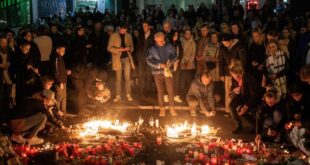MONROVIA/DAKAR (Reuters) – When Joseph Boakai won a place at Liberia’s prestigious College of West Africa in the 1950s, he helped pay his fees by working as the school janitor, cleaning floors and toilets at night and studying by day, his spokesman Amara Konneh told Reuters.
Now Boakai, a 78-year-old political veteran, is set to become Liberia’s president after a narrow victory in Tuesday’s run-off vote over former soccer star incumbent George Weah, who conceded defeat late on Friday as the streets of the capital Monrovia erupted in celebration.
Boakai’s win marks the high point in a long career, much of it spent within touching distance of power, including 12 years as vice president under Weah’s predecessor Ellen Johnson Sirleaf. He lost in a run-off vote to Weah in 2017.
Supporters say his hard work, humility and experience are what voters want after six years of Weah rule that initially brought hope, fame and glamour to the presidency but were marred by corruption and administrative chaos.
“Boakai strikes me as a grandfather figure – someone you would trust with your life. And now we are trusting him with the country’s life,” said scholar and activist Robtel Neajai Pailey.
He faces a huge task to rebuild Africa’s oldest republic which was founded by freed slaves from the Americas in 1822 but has struggled to emerge from two civil wars that killed more than 250,000 people between 1989 and 2003, and from a 2013-16 Ebola epidemic in which thousands died.
The economy grew 4.8% in 2022, driven by gold production and a good rice and cassava harvest, but more than 80% of the West African country’s population of 5 million still face moderate or severe food insecurity, World Bank data show.
Drug use is on the rise among the jobless youth, officials say. Power supply is unreliable across the forested countryside, and pitted roads hinder travel. Last year Liberia was ranked poorly on Transparency International’s corruption index, coming in 142nd out of 180 countries.
Tuesday’s run-off came after a tightly fought first round in October, in which neither candidate passed the 50% of votes needed to win outright. Official results on Friday showed Boakai had 50.9% of the vote over Weah’s 49.1%, with more than 99% of votes counted, prompting Weah’s concession.
In an interview shortly after the results, a softly-spoken Boakai told Reuters that his primary focus would be to bring the country together after a divisive election.
“First and foremost, we want to have a message of peace and reconciliation,” he said.
Konneh, the spokesman, told Reuters on Friday that Boakai would focus initially on education, health, agriculture and the economy, including reining in debt.
“He will give our people hope. He will fix the economy so everyone’s life will improve,” he said.
HUMBLE BEGINNINGS
The son of farmers, Boakai was born in the remote village of Warsonga on the border with Sierra Leone, 150 miles (241 km) from Monrovia, his official biography says. He did odd jobs, including tapping for rubber, before heading to Monrovia in search of an education.
He graduated from university and after taking jobs in the private sector was appointed agriculture minister. In 2005 he was promoted to vice president of Sirleaf’s post-war government.
Now, many see his scandal-free public life and calm demeanour as an antidote to Weah, whose glitzy career as one of Africa’s best ever soccer players took him to clubs in Milan, London and Paris, but which critics say left him ill-equipped to rule.
Boakai, meanwhile, quietly grafted away at home.
After Weah was elected in 2017, he showed a Reuters reporter around his unfinished house in Monrovia, which had a new watchtower and high walls topped with fresh coils of barbed wire. He inspected a new Toyota SUV while sporting a blue suit and gold watch.
Boakai, meanwhile, lives in a relatively modest bungalow that has barely changed since he moved in 50 years ago.
“You can see the difference between the two,” said motorbike taxi driver Prince Jaygbah. “There will be no more corruption in Liberia.”
Questions remain about Boakai’s age and energy. He has been dubbed “sleepy Joe” for allegedly falling asleep at public events.
His campaign shrugs off the concern.
“He may be old, but he is as sharp as a razor,” Konneh said.
(Writing by Edward McAllister; editing by Clelia Oziel)
 BeritaKini.biz Berita Viral Terkini di Malaysia
BeritaKini.biz Berita Viral Terkini di Malaysia





